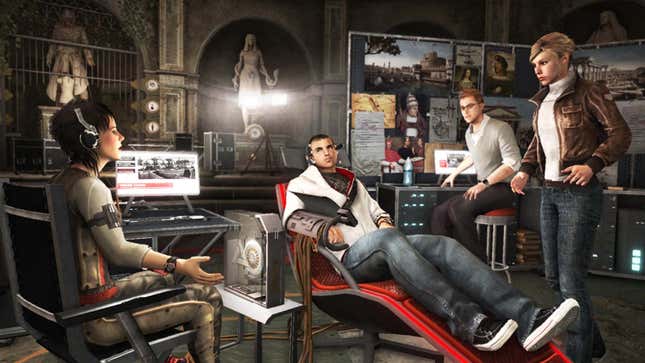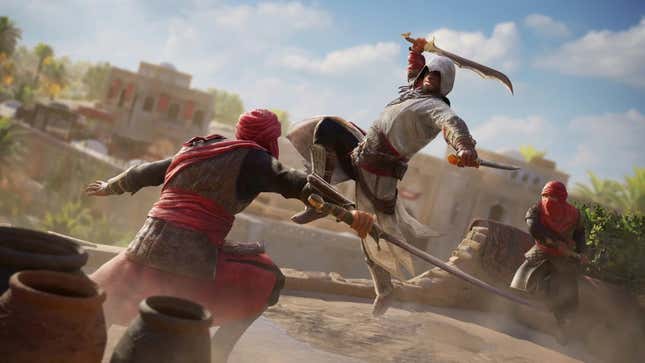
Over the weekend, Ubisoft announced about 50 different Assassin’s Creed games and projects. (Editor’s note: It was a lot…but not 50). The company also laid out the future of the series and how its upcoming hub, Infinity, will bring the franchise together in a way that we haven’t seen before. It also explained that moving forward, future games would ditch the modern-day storyline. Instead, all that meta-narrative stuff will live on in this new Infinity hub. While I get some of the reasoning behind this shift, I’m sad to see it happen as it could rob the series of its personality and quirks while making the historical stories it tells lose some context and meaning in the process.
Since the very first Assassin’s Creed game in 2007, the franchise has always mixed historical tales of action and adventure with a modern-day story of conspiracies and shadowy organizations fighting for control of the planet. Also, aliens, powerful artifacts, and past super civilizations were involved, too. With each game in the series, the modern-day storyline would continue, often getting weirder and more complicated with each entry.
In the last major Assassin’s Creed game, Valhalla, the meta-narrative involving the war between assassins and templars reached a new level of absurdity, while also pulling a late-game twist that has me excited to see what happens next. And now, how much more I and other lovers of the modern-day stuff will end up getting is up in the air, which is a shame.
In an interview with Eurogamer, Marc-Alexis Coté, the head of Assassin’s Creed at Ubisoft, explained that splitting off the meta-story from the historical adventures came down to the fact the devs were never able to find the right balance. He said that the people who love the meta stuff—people like me—always want more. Meanwhile, the folks who don’t like the modern-day narrative just want to jump into ancient Egypt or Greece without having to deal with Layla or Abstergo at all.
“We’re in a situation where no one’s happy with it,” said Coté. “In the sense that people who love it never get enough and the people who don’t like it will always have too much.”
I’m sympathetic to Ubisoft being unable to make everyone happy. I get it. I know people who hate the modern-day stuff with every fiber of their being, but who still want to play the next big Assassin’s Creed game because the historical settings are interesting and fun to explore. And it’s very likely that a lot of people might be skipping Assassin’s Creed games because they find the overall meta-narrative too confusing and annoying. So splitting it up, from a business perspective, is probably the right call.
However, removing the modern-day segments and narrative from future games also removes one of the more interesting components of the franchise. That mix of batshit sci-fi and ancient history is one of the things that keeps me coming back to the franchise. There are plenty of games that let me ride around on horses and fight people in castles. But Assassin’s Creed offers this otherworldly element that I always appreciated, even when it wasn’t perfect.

It also makes the context of why or how you are even able to explore these past histories shallow. Remember, in Assassin’s Creed you aren’t changing the past or making decisions, technically.
Take Assassin’s Creed III, for example. You are seeing the “real” history of the American Revolution and how the assassins and templars were involved. In ACIII, each group plays both sides of the historical events and in many ways cared less about the people directly involved. Instead they’re more concerned with their bigger, longer plans. Like other AC games, the way the meta-narrative connects to the past is often the most interesting part of the historical chunk of the game. And I doubt future Assassin’s Creed games are going to completely remove the assassins, their history, or the allure of seeing what really happened. But without the context of a modern-day observer stepping back into the past via DNA memories, each entry risks feeling like yet another separate, generic action-RPG set in different corners of the world.
And if Ubisoft continues to tell stories about the assassins and templars in these future, historical-only entries, will people (especially new players) even care or understand who they are? Being able to bounce back and forth between the past and the present not only made the conflict between these groups feel bigger but it also gave more weight and context that made the games more interesting to think about.
Ubisoft seems to be aware of this issue. That’s clearly why they aren’t completely removing the Animus framing device. When playing future games, folks will still see a DNA explorer before jumping into the Japan-set Assassin’s Creed Project Red. But it won’t be connected to the other entries the same way earlier games were.
“I want to keep the DNA explorer abstraction or the Animus because I think for whoever plays Assassin’s Creed, it’s important that they understand that you return to the past not to change it, but to learn something about it,” said Coté. “And I think it’s important to keep that abstraction.”
It’s easy to write off the modern-day stuff found in Assassin’s Creed as nonsense and an obstacle to the “real” games. In fact, I can already envision the comments and tweets about this article. I imagine people rushing in to say that cutting the modern stuff out is good and that the meta-narrative was bad and just ruined the games. I also fully expect future games to sell better or connect with more people after Ubisoft rips the modern-day narrative out of the series. Which, from that perspective, is fine and all.
Yet, I will miss the messy and wild era of Assassin’s Creed, where you’d bounce back and forth between the past and the future, often learning more about each side as you did. Maybe it has become a huge, complicated nightmare of lore in 2022, but at least it wasn’t boring and helped give the franchise its own unique identity. Now, that might all be lost inside some hub that many will just never experience.